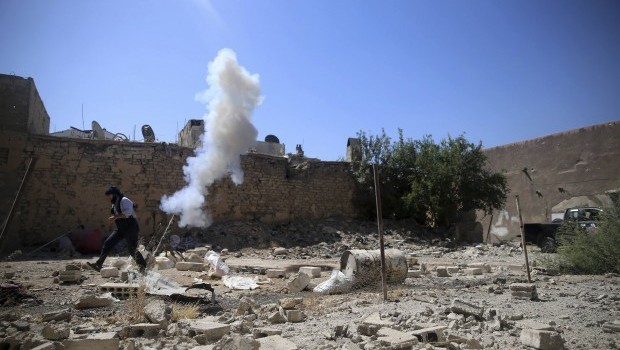
A member of the Ansar Dimachk Brigade, part of the Asood Allah Brigade which operates under the Free Syrian Army, fire a homemade mortar at one of the battlefronts in Jobar, Damascus, on September 15, 2013. (REUTERS/ Mohamed Abdullah)
However, they also said that despite waiting for a strike that never materialized, the armed opposition was planning a series of organizational changes that would make it a more effective fighting force.
Sources from the Syrian National Coalition of Revolution and Opposition Forces told Asharq Al-Awsat that moves to transfer funds requested by the Joint Chiefs of Staff of the Free Syrian Army (FSA) to establish a national army under the umbrella of the coalition were going ahead and would result in substantial changes on the ground in favor of the opposition.
The chairman of the FSA Joint Chiefs of Staff, Salim Idris, promised on Friday “important developments on the ground very soon” and presented a “plan to the Joint Chiefs of Staff to establish a military institution at an estimated cost of USD 10 million.” The sources added that Idris received assurances that this money would be made available within a short time.
The spokesman for the FSA Higher Command, Qasim Saadeddin, told Asharq Al-Awsat that “if we had sophisticated weapons, the air force would not have able to fly over us and attack our positions,” adding that “the regular army is advancing in the Ghouta area by killing civilians by aircraft and chemical weapons, which it has resorted to in order to cover its failure on the ground.”
Meanwhile, Syrian state news agency SANA has been reporting advances by the regular army in Homs and Damascus. This has been denied by activists on the ground.
Isma’il Al-Darani, a member of the Revolution Command Council, told Asharq Al-Awsat that the FSA has made some great advances towards northern Damascus in the direction of the Qalamoun mountains, which are strategically placed between Damascus and Homs. He added that “the opposition controlled many areas in that region, including the town of Maaloula, which the FSA withdrew from after two days, because of the sensitivity of the town and its historic and religious location, and in order to preserve its sites from bombardment by the air force.”
Darani said the opposition aimed to take the battle to the capital Damascus next, as it was currently fighting on three fronts near Damascus, as well as the Abbaseen area inside Damascus. He added that “the next target would be to topple the regime militarily . . . which would need new tactics and new weapons suitable to the nature of the new battle.”
Darani added that the opposition “were laying plans to take control of the government positions after the strikes and were preparing to exploit them to reach the surrounds of the presidential palace three hours after the strike on Mazzah Military Airport, as well as taking total control of the northern entrances to the city from the Ghouta side once the Damir Military Airport was hit.”
